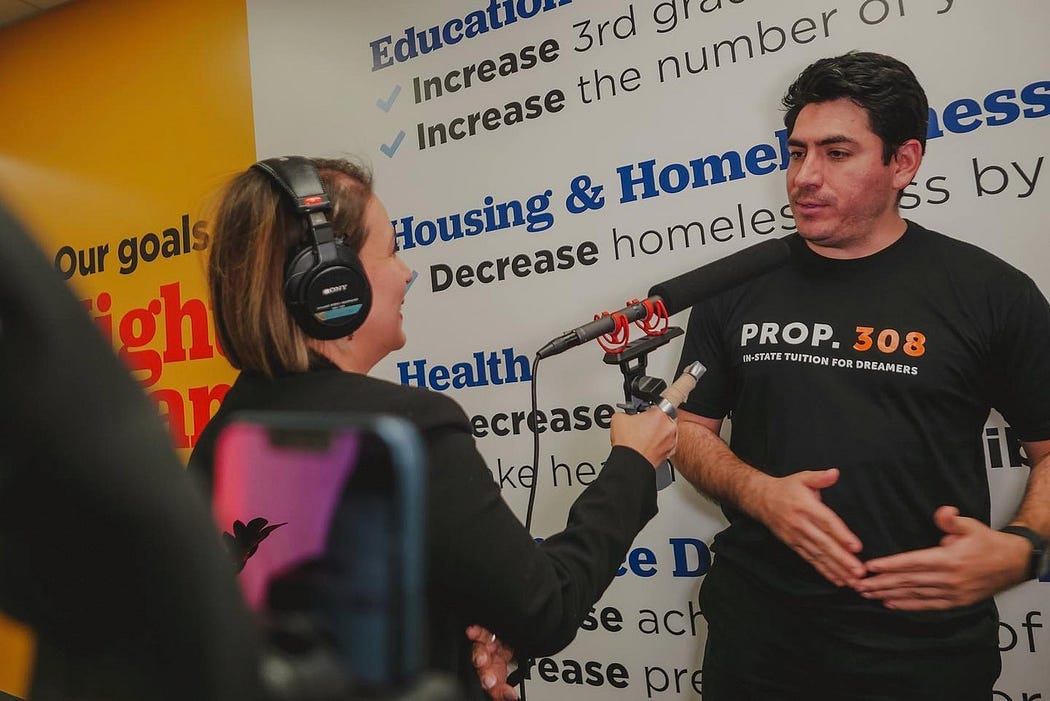Innovative engagement strategies power INN member newsrooms
September 7, 2023
Nonprofit newsrooms redefine relationships between readers and media organizations, engaging them through loyalty, community and service. Across the INN Network, creative engagement strategies have successfully cultivated connections, showing what newsrooms could do for and with their audiences to keep them engaged with their work and brand.
Get creative with reader gifts that say something about you
Prison Journalism Project (PJP) created a Spotify playlist for their donors, a new take on branded gifts like New Yorker’s tote bags or a PBS mug. For some small nonprofit newsrooms, producing and shipping gifts is not feasible.
“That is too heavy of a lift for a small, stretched-thin organization,” Teresa Tauchi, chief operating officer of the Prison Journalism Project, said. “We had to be creative in terms of what we could give back to our donors.”
PJP gifted their donors a Spotify playlist of songs selected by their incarcerated writers. The 2022 playlist contributed to an overwhelmingly successful end-of-year fundraising campaign. The playlist features more than 100 songs from various genres, including rap, pop, gospel and soul.
“You really get a sense of the diversity of the people behind the music,” Tauchi said. “We want to bring transparency to an opaque criminal legal system. To get voices from the inside, from behind bars is rare, and we want to bring them out. It was something that I think represented our writers the most widely, and it was just kind of this intriguing little bonus to get as a donor at the end-of-year campaign.”
PJP publishes original content from incarcerated writers and is grounded in telling authentic stories that humanize and contextualize the experience of incarceration. The playlist, paired with personal direct asks throughout the campaign from incarcerated writers and those impacted by the criminal legal system, fueled their end-of-year fundraising campaign. This year, they are replicating the project with songs that inspire creativity amid incarceration.
“There are people who are genuinely interested and really care about criminal legal reform, and to reach out to this audience and make them care about people who are incarcerated, and build a community around our writers and people who are incarcerated in general serves our mission,” Tauchi said. “That’s the main thrust behind this playlist: it’s a very personal way we can bring our audience and our writers together.”
The Conversation offered their donors a free eBook of their previously published pieces in a printable, free-to-transfer PDF, to help their donation requests stand out among a sea of end-of-year emails.
“What we know about our audience is that they value us for helping them understand the world and understanding complicated things,” Joel Abrams, director of digital strategy and outreach, said. “We sent a lot of messages about what you can do for us, so it was nice to say here’s what we can do for you.”
The Conversation partners with academics to unlock knowledge on current issues.
The eBook features multiple stories on artificial intelligence that explain the technology and stay true to the organization’s mission to produce thoughtful and well-researched explainers of nuanced topics. The eBook structure has been used to compile different pieces on climate change and the war in Ukraine. With a working template at their disposal, the project was cheap to produce.
“Even if they didn’t read it, it was on-brand for us to give those explainers tied up in a bow,” Abrams said. “From our surveys, we know our core readers and donors are older, so we guessed they might want a printed experience.”
Plug into existing networks to engage more deeply
Conecta Arizona engages its audience on a platform they are familiar with: WhatsApp. This nontraditional distribution model emerged from the COVID-19 pandemic, filling a void of Spanish-language reporting for Latinos in Arizona and Mexico. Maritza Félix, founder of Conecta Arizona and self-proclaimed queen of WhatsApp, started fact-checking COVID-19 misinformation for friends and family, which grew to over 1,000 members in a WhatsApp channel gathering around a daily “Hora del Cafecito,” where the entire group convenes to talk about anything from celebrity gossip to serious political and legal issues.
“Everything that we have done is based on listening to the community,” Félix said. “WhatsApp is something that we already use. There are some people who say, ‘I don’t download any more apps.’ We’re meeting the community where they are.”
Once a week, Félix brings an expert into La Hora del Cafecito group chat to answer questions on a relevant topic for the group, like immigration law, mental health or COVID-19 safety. Typically, La Hora del Cafecito gets about 170 messages in the hour, but when an expert is there on Thursdays, it often goes up to 300 messages.

“If my community switches to another platform in one year, I’ll move with them because that’s the whole purpose of Conecta Arizona,” she said. “The success of it has been listening in support of the community.”
Building upon this online community was guided by community listening and flexible programming, so the measured successes of Conecta Arizona’s engagement projects can be amorphous.
“We have been measuring this the wrong way. We want to measure something innovative and experimental and not traditional, but we are using the old metrics of legacy media which is dying,” Félix said. “I have numbers now. I can tell you we have thousands of members in our newsletter and our WhatsApp channel. We have interviewed more than 500 people on the radio, and have had more than 200 experts join us on WhatsApp. I can show you that. But that’s not the important part of the work that we do. And educating funders on this has been hard.”
High Country News’ (HCN) summer reading challenge fills a two-page spread in the summer editions of their monthly magazine. Their nine reading prompts written by staff members include “read a book that queers a traditional narrative” and “read a book where the protagonist is a river.” Participants can input their picks and upvote each other’s books on their website, order the book online, or find it in a library near them.
“It was a creative way to get readers to talk back to us,” Michael Schrantz, marketing and communications manager at HCN and founder of the summer reading challenge, said. “I was like, what if we did a challenge like you used to get from the library when you were a kid? I always had really fond memories of taking those sheets home and filling out how much I read, and I’m sure a lot of other people have those too.”
HCN previously included a yearly book edition that has since been phased out, so Schrantz knew a book-friendly audience was there. He started the challenge last summer with a bingo card and has since expanded the product through a website and live-streamed author events.

Someone has already finished the nine books in the reading challenge at High Country News and will be featured in the magazine next month. Moreover, Schrantz says the reading challenge built a relationship between readers and the editorial board.
“We’re happy that people are engaging and talking with us. The reading prompts are a way to get to know editors; they show you a little bit of their personality when they write those reading prompts. And it was another way to get readers in the magazine,” Schrantz said.
Find what works for you
INN members have shown that the best engagement practices build on shared values, compassion and creative acts of service. INN members understand their audiences, brands, and capacity for additional projects, and encouraging nontraditional engagement practices can yield commitment, loyalty, and a newfound appreciation for your work.
“We believe we can play with it, we can experiment, and we can innovate,” Félix said. “If it doesn’t work out, we’ll learn something and move on.”
